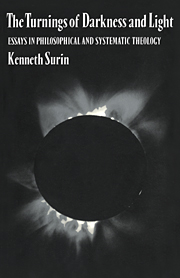Book contents
- Frontmatter
- Contents
- Dedication
- Preface
- Abbreviations
- 1 Creation, revelation and the analogy theory
- 2 The Trinity and philosophical reflection: a study of David Brown's The Divine Trinity
- 3 ‘Is it true what they say about “theological realism”?’
- 4 The impassibility of God and the problem of evil
- 5 Theodicy?
- 6 Tragedy and the soul's conquest of evil
- 7 Atonement and moral apocalypticism: William Styron's Sophie's Choice
- 8 Atonement and christology
- 9 Revelation, salvation, the uniqueness of Christ and other religions
- 10 ‘Many religions and the one true faith’: an examination of Lindbeck's chapter 3
- 11 Contemptus mundi and the disenchanted world: Bonhoeffer's ‘discipline of the secret’ and Adorno's ‘strategy of hibernation’
- 12 ‘The weight of weakness’: intratextuality and discipleship
- 13 ‘Theistic arguments’ and ‘rational theism’
- Notes
- Index of names
- Index of subjects
4 - The impassibility of God and the problem of evil
Published online by Cambridge University Press: 19 January 2010
- Frontmatter
- Contents
- Dedication
- Preface
- Abbreviations
- 1 Creation, revelation and the analogy theory
- 2 The Trinity and philosophical reflection: a study of David Brown's The Divine Trinity
- 3 ‘Is it true what they say about “theological realism”?’
- 4 The impassibility of God and the problem of evil
- 5 Theodicy?
- 6 Tragedy and the soul's conquest of evil
- 7 Atonement and moral apocalypticism: William Styron's Sophie's Choice
- 8 Atonement and christology
- 9 Revelation, salvation, the uniqueness of Christ and other religions
- 10 ‘Many religions and the one true faith’: an examination of Lindbeck's chapter 3
- 11 Contemptus mundi and the disenchanted world: Bonhoeffer's ‘discipline of the secret’ and Adorno's ‘strategy of hibernation’
- 12 ‘The weight of weakness’: intratextuality and discipleship
- 13 ‘Theistic arguments’ and ‘rational theism’
- Notes
- Index of names
- Index of subjects
Summary
According to a certain strand in the orthodox Christian tradition, God's impassibility is an implication of the divine immutability. For if God cannot change then he cannot ‘experience’ pain or sorrow. This fundamental principle was appropriated from Plato, who maintained that a being who is perfect can experience neither sadness, pain, nor sorrow. Some modern Christian philosophers and theologians, however, concede that this is perhaps the most questionable aspect of certain forms of orthodox Christian theism.
The following ‘facts’ are alleged to imply the impassibility of deity:
(1) God, it is said, has no direct experience of sorrow and pain. Whatever experience he has of them is the result of his ‘imaginative response’ to the sufferings of his creatures. Nothing in God can cause him to feel pain, for the following reasons. God cannot feel physical pain because he is incorporeal; he cannot experience fear because he is omnipotent; he cannot know the pain of loneliness because he is wholly self-sufficient; and he cannot experience the pain of guilt because he is morally perfect. Neither can he know any mental pain, if he lives up to Nelson Pike's description of an atemporal being:
A timeless being could not deliberate, anticipate, or remember. It could not speak or write a letter, nor could it produce sounds or written words on a piece of paper. It could not smile, grimace or weep. Further a timeless being could not respond … to needs, overtures, delights or antagonisms of human beings.
Information
- Type
- Chapter
- Information
- The Turnings of Darkness and LightEssays in Philosophical and Systematic Theology, pp. 57 - 72Publisher: Cambridge University PressPrint publication year: 1989
